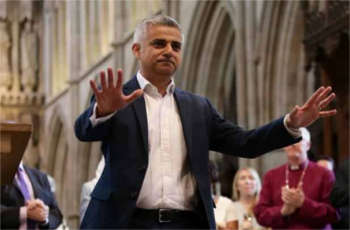The new mayor of London, Sadiq Khan, has taken office at a pivotal time for the capital. Massive population growth is expected to swell the city to some 11 million people by 2050, a third larger than it is today.
Much of the groundwork to cope with that increase, particularly in transport, infrastructure and housing, has to be laid now. We take a look at the mayor’s pledges and what they herald for London.
The bus drivers’ son has ‘hit the ground running’ with his first official engagement, attending the UK's Holocaust Memorial Ceremony in Barnet, taking various meetings with key stakeholders including the Metropolitan Police and Transport for London and, according to reports, answering or returning some 1,000 texts and phone calls.

Sadiq Khan enjoys a massive victory in London
He will need to keep up this intensity if he is to tackle some of the city’s more pressing infrastructure problems.
The financial brakes have been put on TfL, with the Government phasing out the capital’s operational budget of almost £700m a year by the end of the decade.
Mr Khan has pledged to keep investment in transport going despite a commitment to freeze all TfL fares, to maintain the congestion charge at its current level, to guarantee the Freedom Pass and the over-60s Oyster card, along with all other existing concessionary fare schemes and even freeze charges for the mayor’s cycle hire scheme for the next four years.
He has also pledged to press ahead with the Night Tube and the major infrastructure projects ‘such as a potential Crossrail 3, new orbital links for outer London, DLR and tram extensions, and new river crossings for East London’, as well as ensuring the proposed Bakerloo line extension to Lewisham and beyond goes ahead.
His predecessor made a commitment to ‘bear down’ on fares, but prices still rose. Mr Khan has said he will fund the fare freeze by a combination of efficiency savings, and new revenue streams making it a more ‘profitable operation’. As revealed by Transport Network, Mr Khan is also unlikely to be spending large sums on any inner-city road tunnels anytime soon.
The Labour mayor has called TfL an ‘inefficient and flabby’ organisation.
He has pledged to ‘merge engineering functions within TfL – ensuring shared procurement and office functions save millions each year’. There will also be less work for those outside of the organisation, after Mr Khan promised to reduce the use of consultants and agency staff.
‘TfL spent £383m on consultants and agency staff last year – a figure which I will aim to halve,’ he said.
Alongside this, Mr Khan has pledged to establish ‘a trading arm that can run bus and other local transport services and sell TfL’s expertise, at home and abroad’.
This tactic of selling TfL’s undoubtedly world-leading expertise is something the organisation has shied away from in the past, despite being called on to offer advice around the world and to other authorities in England. Highways England has also previously rejected the idea that it could sell services or consultancy for a profit, however if TfL leads the way…
Mr Khan also wants to extract revenue by putting ‘spare TfL land to better use - retaining ownership while building affordable and market homes, as well as commercial space’. In this regard it might be following the lead of Network Rail, now run by former TfL commissioner, Sir Peter Hendy, which recently announced plans to set up a property company.
On air pollution Mr Khan has suggested the possibility of bringing forward the Ultra-Low Emission Zone planned for 2020, and expanding it along major arterial routes or a wider section of central London. He also wants to introduce Clean Bus Corridors– prioritising new, clean buses for services in the most polluted parts of the capital – and set a target of only buying clean electric or hydrogen buses from 2020.
Like his defeated opponent Zac Goldsmith and his predecessor Boris Johnson, Mr Khan opposes a third runway at Heathrow and wants to expand Gatwick. However his ability to influence this decision is likely to be limited.
One area that will not change under Mr Khan is TfL’s relentless expansion. He has pledged to push for TfL to take over responsibility for more commuter routes.
A strong foundation has been put in place at TfL since the mayoral system was established, helping it become the envy of transport bodies around the world. Mr Khan has ambitious plans to let TfL now spread it wings, and expand across the country and the world in terms of its commercial potential. However he has also set himself a difficult task when it comes to balancing its books and maintaining services in London.
In passing...
Much has been made of the controversial campaign waged by Mr Khan's main opponent, Conservative Zac Goldsmith. Many pundits and politicians have weighed in to attack the climate of hostility it created by linking Mr Khan, a moderate, former human rights lawyer, with extremism. No matter what one might think of Mr Goldsmith's tactics, which were supported by top Tories including the prime minister, at this stage it is simply worth pointing out the obvious. Those controversial tactics failed, Mr Goldsmith lost, and those politicians seeking to win in London, let alone keep their reputation, would do well to remember this.